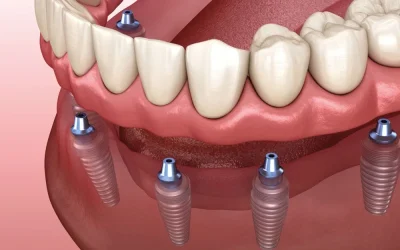Tooth loss can affect our quality of life, both aesthetically and functionally. Dental implants have become the most popular solution to compensate for this loss in recent years. However, many people considering dental implants are concerned about post-procedure pain and recovery. So, how common is post-procedural pain and how long does it last? What are the possible discomforts after an implant?
In this article, we will discuss the pain and recovery process after dental implants step by step and inform you about what you can expect during this process.
Will There Be Pain After Dental Implant?
Dental implants are a procedure that uses titanium screws to replace missing teeth. Most patients may experience mild pain or discomfort for a few days after the implant procedure. However, this pain is usually minimal and often passes quickly with good healing.
The level of pain after an implant can vary from person to person. However, in general, this pain is milder and more manageable than more invasive procedures such as tooth extraction. Since local anesthesia is used during the procedure, patients do not feel any pain during the procedure. However, once the anesthesia wears off, some pain, swelling, and tenderness may occur in the area where the implant was placed.
These symptoms usually begin to subside within 3-5 days and are completely gone in most patients within 1 week. Painkillers prescribed by your doctor will usually be sufficient to manage the pain. However, if you are concerned about any risk of complications, it is important to consult your dentist.
In summary, post-implant pain is an expected condition, but this pain is often mild and passes quickly with appropriate treatment. With good care and follow-up, you can easily get through the recovery process.
Is it normal to feel pain after Dental Implants?
Yes, pain and tingling after dental implants are normal and generally expected. It is important to remember that implant placement is a surgical procedure, so some discomfort, pain and swelling may continue for a period of time. You will not feel any pain during the procedure as your dentist numbs the area, but pain, swelling or tenderness may occur as the surrounding tissues heal after the anesthesia wears off.
Post-implant pain usually occurs in the following situations:
- Surgical Intervention: Before the implant is placed, a small hole or sometimes a small incision may be required in the jawbone. After this procedure, a healing process begins in the surrounding tissues, which may cause temporary pain.
- Tissue Healing: After implant placement, the surrounding soft tissues and bone require time to heal. Mild pain and swelling are normal during this healing process.
- Wound Healing Process: There may be short-term pain in the area where the implant is placed, during the removal of stitches or regeneration of tissues.
However, post-implant pain usually subsides within a few days, and most people can resume normal activities within a week. Your doctor will prescribe appropriate painkillers and care instructions to help you manage pain during your recovery.
However, if the pain becomes severe or persists after 7-10 days, it could be a sign of infection or other complications. In this case, it is very important to contact your dentist.

How do you get rid of Dental Implant pain?
Although post-implant pain is usually temporary, if the pain persists for a long time, you may need to take some steps. Here are some things you can do for long-term implant pain:
- Consult Your Dentist: If the pain does not go away within 1-2 weeks, there may be a complication. There may be an infection or another problem that occurred during implant placement. Your dentist can evaluate the situation with x-rays or examination and recommend the necessary treatment.
- Infection Control: Infection is one of the most common causes of long-term implant pain. If you have signs of infection (swelling, fever, bad breath, etc.), you should contact your dentist immediately. Early intervention can prevent serious complications.
- Painkiller Use: Painkillers recommended by your dentist can control the pain. However, if the pain continues and painkillers are not enough, your doctor may recommend different treatment methods or medications.
- Good Oral Care: Practicing good oral hygiene can help reduce the risk of infection around the implant. Gentle brushing, mouthwash, and antiseptic solutions can speed up the healing process.
- Injury or Tight Fitting Control: If the denture or crown placed over the implant is not properly fitted, it may cause pain. Your dentist can check the fit of the denture and make adjustments if necessary.
- Gum Problems : Inflammation or infection in the gums around the implant can cause long-term pain. Gum disease or recession can cause discomfort. Therefore, regular gum check-ups are important.
- Avoid Smoking: Smoking can negatively impact the healing process and increase the risk of infection at the implant site. It may be helpful to reduce or quit smoking to prevent long-term pain.
It is important to contact your dentist quickly to determine the underlying cause of long-term implant pain and to initiate appropriate treatment methods. Proper care and timely intervention are essential for implant treatment to be successful.
How long does the pain last after a tooth implant?
Pain after dental implants is usually temporary and usually subsides within a few days. However, the length of time it takes for the pain to subside can vary from person to person. Here is a general range of time:
- First 24-48 Hours: Pain may be felt most intensely in the first two days after the implant procedure. During this period, pain begins after the effect of anesthesia wears off and can often be sharp or uncomfortable. However, this pain can be easily managed with painkillers recommended by your doctor.
- Days 3-5: Post-implant pain usually decreases during this period. Swelling and bruising may also peak during this time, but the pain gradually subsides. Most patients can manage the pain and continue with their daily activities during this time.
- 1 Week: After one week, the pain is mostly gone. The swelling has gone down and the pain may be just a mild discomfort. The healing process is accelerated.
- After 2 Weeks: Most people begin to fully recover within 10-14 days. Pain is usually very rare at this time, although there may still be some tenderness or discomfort at the implant site.
If the pain persists after 2 weeks, this could be a sign of a complication. In this case, it is important to contact your dentist. It could be an infection, implant displacement, or another problem.
Post Dental Implant Painkiller Use
Post-implant pain is usually temporary and mild, but painkillers are important to manage pain during this time. Your dentist will usually recommend appropriate medications to reduce pain and speed up the healing process. Painkillers usually relieve pain by reducing inflammation and swelling, but medication is only temporary and the pain subsides within a few days.
It is important to remember that medications must be used correctly. Medications should be taken in the dosage and for the duration determined by your physician. In case of prolonged pain or severe discomfort, it is necessary to contact your dentist to re-evaluate the treatment process. In this way, any infection or other complications that may occur around the implant can be detected early and appropriate treatment can be started.
For Post-Implant Comfort and Health, Private Sevenhills Dental Clinic!
Tooth loss can negatively affect a person not only in terms of aesthetics but also in terms of functionality. As Sevenhills Dent Clinic , we do not only see dental implant treatment as a solution, but also aim to maximize patient satisfaction at every stage. We are aware that post-implant pain and recovery can deeply affect a patient’s confidence in treatment. For this reason, we create personalized dental treatment plans for each of our patients and take care to provide a comfortable experience at every stage of the treatment process.
Although post-implant pain is mild and temporary in most patients, there are important points to consider during this period. In our clinic, we provide detailed information to each patient before and after treatment, providing complete guidance on how to manage possible pain and how to make the healing process more comfortable.
With our modern technology and expert team, we take all necessary precautions to minimize post-treatment pain and swelling. Your health and comfort come first for us. As Sevenhills Dental Clinic, while we permanently solve the problem of tooth loss with implant treatment , we also inform you at every step and make the treatment process stress-free.





